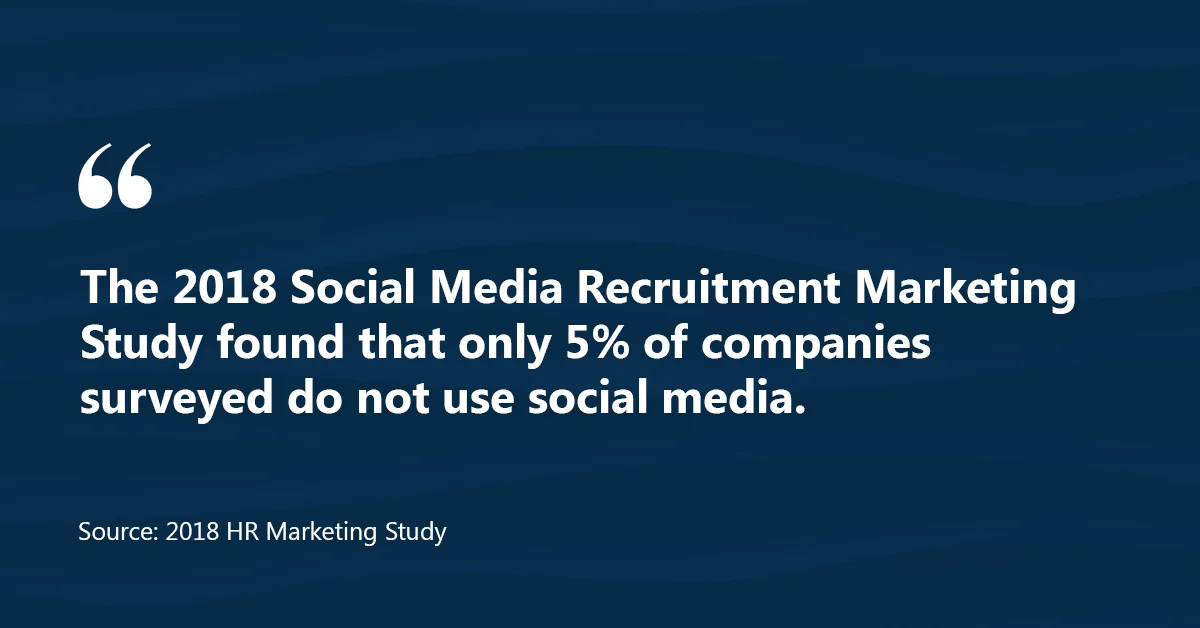
Many companies now feel how the number of applications has gone down. Application processes, largely handled through job postings on Internet platforms, are too passive and so don’t attract enough applications. Nowadays, applicants have plenty of job postings at their disposal, so they look at competing job offers as well. This makes the applicant’s decision a kind of gamble for companies. That’s why they need to make recruiting more successful to get the best talent. One way to do that is social media recruiting.
Definition: Social Media Recruiting
Social media recruiting includes all marketing which companies do on social media platforms to recruit personnel. The most popular social networks for this are pure platforms such as LinkedIn and Xing while social platforms like Twitter, Facebook, Instagram and YouTube are used as well.
Social media recruiting includes both actively searching for and approaching suitable candidates as well as passive measures such as maintaining a career portal. The special feature of social media recruiting is the fast and uncomplicated communication with potential candidates.
Examples of Good Social Media Recruiting
The same methods employed on conventional recruiting channels, are used on social media platforms as well. Here are some social media recruiting examples:
– Career pages and job ads: Build your own career portal on social networks and link it to your existing career site. Job ads should then be published on those social networks. Paid campaigns can help you get enormous reach.
– Content marketing and employer branding: Ideally, you should regularly publish texts, videos and images on the network profiles to appeal to the target group and capture their attention. This strengthens the employer brand.
– Active sourcing: Users leave data on social networks that reveal a lot about their wishes, ideas and preferences. This data must be used to actively search for candidates and address them personally.
Goals of Social Media Recruiting
The goals of social media recruiting include using the multiplier effect to strengthen employer branding and to find potential employees. It can also help you hire them with the help of an efficient application process. Employer branding is about passive employee recruitment, so the strengthened employer brand receives increased attention from qualified workers. Employees who identify with the company tend to work more productively and are more likely to be retained. Companies that target suitable candidates and receive positive feedback shorten the overall application process. If you take the cost of unfilled positions and add the expense of a lengthy application process, you’ll save a lot of money over the course of a fiscal year.
Advantages and Disadvantages of Social Media Recruiting
Advantages:
Social media recruiting opens up new possibilities and brings with it a number of advantages that need to be exploited from a business perspective:
- Addressing the target group takes place in a personal environment – where the target group spends its free time and feels comfortable.
- Contacting people who are not actively looking for work makes it possible to hire professionals with special qualifications.
- There is the possibility to build up an attractive image.
- Data-based candidates can be selected and targeted.
- Whoever achieves high coverage ensures positive viral effects and strengthens the entrepreneurial existence.
- One’s own activities are measurable and lead to better decisions.
Disadvantages:
Active recruiting on social networks opens up a wealth of new opportunities and possibilities. However, social media recruiting also conceals disadvantages that can negatively influence the digital application process:
- Impersonal posts reduce the interest of candidates.
- Those who post too few comments receive fewer likes and shares.
- Those who publish too many posts annoy their followers.
- Every platform works differently: content that is successful on one platform may not work on another.
Reasons for Few Applications
Many companies are looking for staff and are surprised that even after implementing all conceivable measures, far fewer applications are received than expected. Plus, the manageable number of candidates often lack the required qualifications for the vacant position. These 3 facts should give you insight into the low number of applications received:
Fact 1: The skills shortage is pervasive. Qualified candidates can more or less choose their employer.
Fact 2: Most companies have outdated or conservative application procedures that do not go down well with the younger generation, in particular.
Fact 3: Young talents do not actively search on job portals or newspaper ads and are already presented with attractive offers beforehand.
Use Recruitment Process Outsourcing
Have you already started some measures and are still unable to find qualified candidates? This is quite common in certain industries. In Germany’s IT sector, there is a there is a shortage of skilled workers. So, despite attractive career portals on social media platforms, there are still unfilled positions. The reasons: Those who conduct active sourcing on social networks and have a very high demand for personnel do not have enough time to properly maintain their own company profiles. Recruitment Process Outsourcing (RPO) is an optimal solution for your company to fill vacant positions faster in the future.
Contact our RPO experts now
Especially in the IT industry, qualified specialists are more in demand than ever. Outsourcing4work has access to around thousands of permanent IT experts and fills vacant positions in four to six weeks. With over 25 years in the market and access to a worldwide network, we are happy to be your partner for IT specialists. Contact our RPO experts now and make a free appointment for an initial consultation.


